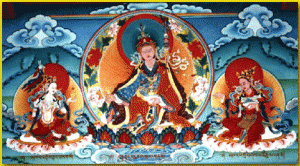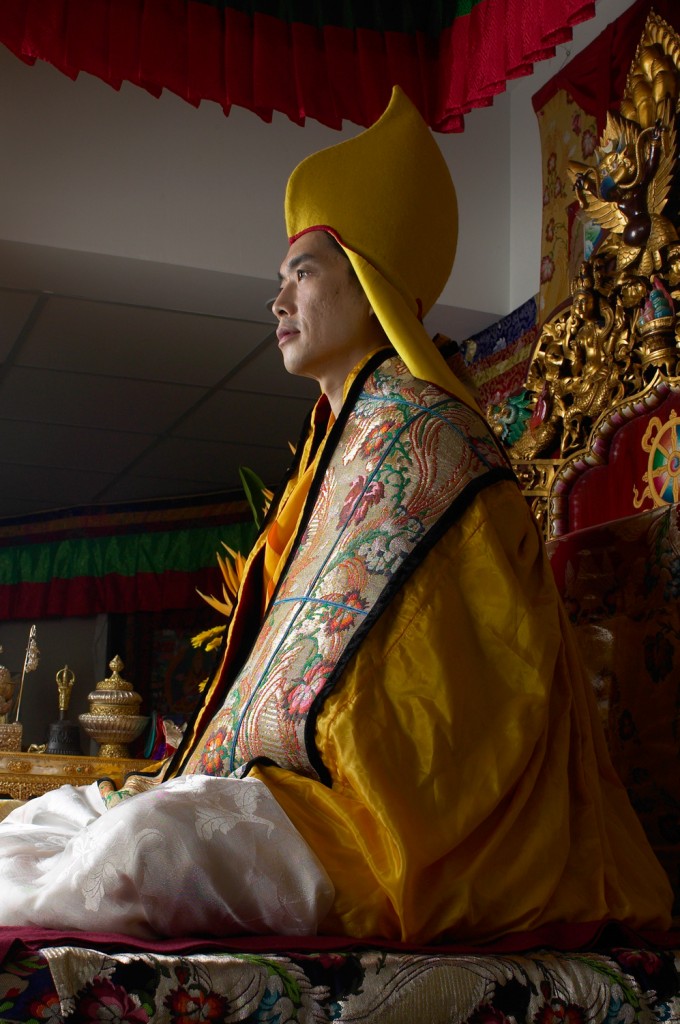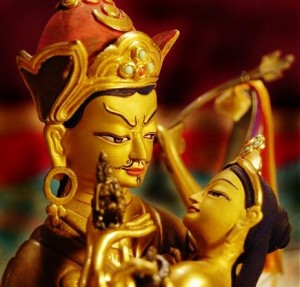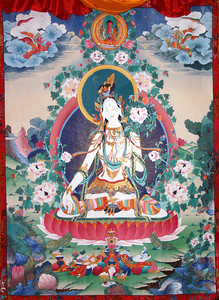The following is respectfully quoted from “Dakini Teachings” by Padmasambhava as translated by Erik Pema Kunsang:
Lady Tsogyal asked the master: If a master himself has not been conferred empowerments and he gives them to others, will they receive empowerments or not?
The master replied: Although you may be appointed by a charlatan to the rank of minister thus entrusted with power, you will only meet with misfortune. Likewise, although you may have an empowerment conferred upon you by a master who himself has not received it, your mind will be ruined. Moreover you will destroy the minds of others and go to the lower realms like cattle yoked together falling into an abyss. Carried away within an iron box with no exits, you will be sent to the bottom of hell.
Lady Tsogyal asked the master: Isn’t the offering of a gift when receiving empowerment just something you yourself have invented?
The master replied: All the teachings and tantras explain that at this present time when you have obtained the fortune of a human body after being on errant paths for innumerable aeons, you should, free from the three spheres of concepts, offer your body, life, and spouse to the master who shows the path of unexcelled enlightenment.
Lady Tsogyal asked the master: How severe is the misdeed of breaking the master’s command?
The master replied: The misdeeds of the three levels of existence do not match even a fraction of the evil of breaking the command of your master. Through this you will take rebirth in the Unceasing Vajra Hell and find no liberation.
Lady Tsogyal asked the master: How should we regard the master possessing the oral instructions from whom we request teachings?
The master replied in verse:
You should know that the master is more important
Than the buddhas of a hundred thousand aeons,
Because all the buddhas of the aeons
Appeared through following masters.
There will never be any buddhas
Who have not followed a master.
The master is the Buddha, the master is the Dharma.
Likewise the master is also the Sangha.
He is the embodiment of all buddhas.
He is the nature of Vajradhara.
He is the root of the Three Jewels.
Keep the command of your vajra master
Without breaking even a fraction of his words.
If you break the command of your vajra master,
You will fall into Unceasing Vajra Hell
From which there will be no chance for liberation.
By serving your master you will receive the blessings.
Lady Tsogyal asked the master: Which is more important, the master or the yidam deity?
The master replied: Do not regard the master and the yidam as different, because it is the master who introduces the yidam to you. By always venerating the master at the crown of your head you will be blessed and your obstacles will be cleared away. If you regard the master and yidam as being different in quality or importance you are holding misconceptions.
Lady Tsogyal asked the master: Why is it important to practice the yidam deity?
The master replied: It is essential to practice a yidam deity because through that you will attain siddhis, your obstacles will be removed, you will obtain powers, receive blessings, and give rise to realization. Since all qualities result from practicing the yidam deity, then without the yidam deity you will just be an ordinary person. By practicing the yidam deity you attain the siddhis, so the yidam deity is essential.
Lady Tsogyal asked the master: When practicing a yidam deity, how should we meditate and practice in order to attain accomplishment?
The master replied: Since means and knowledge are to practice the spontaneously present body, speech and mind through the method of yoga sadhana, they will be accomplished no matter how you carry out the sadhana aspects endowed with body, speech, and mind. They will be accomplished when the sadhana and the recitation are practiced in a sufficient amount.
Lady Tsogyal asked the master: How should we approach the sugata yidam deity?
The master replied: Realize that you and the yidam deity are not two and that there is no yidam deity apart from yourself. You approach the yidam deity when you realize that your nature is the state of nonarising dharmakaya.
Lady Tsogyal asked the master: Which yidam deity is better to practice, a peaceful or wrathful one?
The master replied: Since means and knowledge are practicing the spontaneously present body, speech, and mind through the method of yoga sadhana, all the countless sugatas, peaceful and wrathful, chief figures and retinues, manifest in accordance with those to be tamed in whatever way is necessary–as peaceful and wrathful, chief figures and retinues. But as they are all one taste in the state of dharmakaya, each person can practice whichever yidam he feels inclined toward.
Lady Tsogyal asked the master: If we practice one yidam deity, will that be the same as practicing all sugatas?
The master replied: The body, speech, and mind of all deities are manifested by the three mayas in accordance with the perception of those to be tamed. In fact, no matter how they appear, if you practice one you will be practicing them all. If you accomplish one you will have accomplished them all.
Lady Tsogyal asked the master: Is there any fault in practicing one yidam deity and then practicing another?
The master replied: Although the sugatas manifest as various kinds of families and forms, out of skillful means to tame beings, they are in actuality inseparable, the state of equality. If you were able to practice all the buddhas with this realization of their inseparability, your merit would be most eminent. But if you were to do so while regarding the yidam deities as having different qualities which should be either accepted or rejected, you would be immeasurably obscured. It is inappropriate to regard the yidams as good or bad, and to accept or reject them. If you do not regard them like that, it will be excellent no matter how you practice.
Lady Tsogyal asked the master: Through performing the approach to one tathagata, will we accomplish the mind of all sugatas?
The master replied: By practicing with a vast view and remaining in the nature, you will attain stability in a yidam deity. When you complete the recitation, you will accomplish the activities of all the victorious ones without exception by simply commencing them.
Lady Tsogyal asked the Master: If one’s view is high, is it permissible to dispense with the yidam deity?
The master replied: If you attain confidence in the correct view then that itself is the yidam deity. Do not regard the yidam deity as a form body. Once you realize the nature of dharmakaya you will have accomplished the yidam deity.




